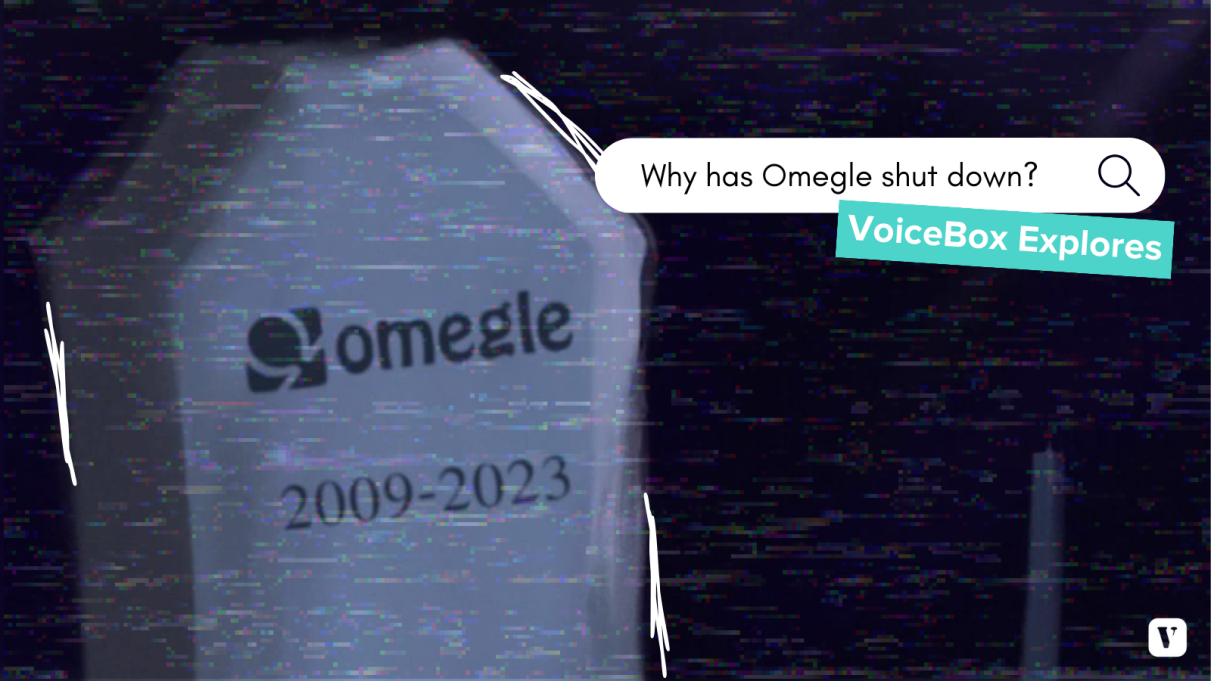
Please note: this article includes sensitive topics that some people might find difficult. Please visit our Resources Page for help.
Omegle, the instant messaging platform, announced this month (November 2023) that it was closing down. The website posted an image of a headstone engraved “Omegle 2009-2023” in a classic offhand style.
Omegle’s move is a pinnacle moment for online culture that has the potential to spark a domino effect across similar services. But why?
What is Omegle?
Omegle was founded by programmer Leif K-Brooks in 2009 at his parent’s house. It quickly rose in fame thanks to its questionable practice of pairing strangers together who communicate through messaging, video chat, or both.
K-Brooks’ intention to introduce “a form of social spontaneity that I felt didn’t exist elsewhere”.
What are the issues?
Many young people have experienced Omegle in one form or another, with teenagers, in particular, notable users of the website. Teenage girls especially were exposed to sexually explicit imagery on Omegle’s video chatting, for some, one of the earliest encounters with risky behaviour online.
“At some point, my sleepovers transitioned from feel-good films to playing on Omegle. There would be so much sexually explicit stuff, always met with shrieks of laughter and clicking onto the next random pairing. Sometimes, really old men would be telling you you were pretty and to remove your top. At such a young age, it became a joke between friends, which innocently marked the beginning of the explorative teenage years.” – Anonymous young person.
While plenty of teenagers were aware of the risks of Omegle, any notion of real predatory behaviour felt far away. After all, a random individual on the other side of the screen is hardly enough to warrant concern – right?
“When rumours circulated, the onus was always on the minor for being ‘silly’ and not on the influx of adults using Omegle to take advantage of minors.” – Young person.
For many, Omegle disappeared into the ether of ‘first’ dodgy online experiences alongside websites like ‘AskFM’, a platform ripe for bullying. For those now in adulthood, the news that these shifty instant messaging platforms were finally meeting their fate was met with both relief and distress that the platform was still functioning in such a risky way.
“When I first heard the news story of it shutting down, and with an adult perspective - I was distressed to hear nothing had changed.” – Young person.
The pandemic
When the COVID-19 pandemic hit in 2020, Omegle resurfaced as the ‘fun’ and ‘reckless’ platform so familiar to those who went to school in the 2010s. Omegle grew globally from 4 million visits a month in January 2020 to 65 million in January 2021. Its revival provided a perfect opportunity for predators to access a constant stream of isolated and vulnerable minors. Infact, August this year (2023) saw a 16-year sentence given to a man who produced child sexual abuse material of 72 victims through Omegle.
By 2022, Omegle had reported half a million cases of child sexual abuse material to the National Center for Missing and Exploited Children, significantly more than any other major platform.
Why was it shut down?
Omegle’s decision to close down followed the landmark case of an American teenager suing the company for randomly pairing her with a paedophile. ‘Alice’ was forced to send him child sexual abuse imagery for three years. She was also coerced into ‘recruiting’ other minors to do the same.
After sentencing, the victim turned her attention to Omegle, which, while not directly responsible, permitted the predatory behaviour to spread. It will be interesting to see whether Omegle’s founder will face a fine or prison sentence for allowing his platform to go unchecked.
The Online Safety Bill
While Omegle is brazen in its permittance of predatory behaviour, any recent lawsuit against the company would have resulted in little retribution for victims.
But, the introduction of the Online Safety Bill has since shifted the responsibility onto big tech to keep their platforms safe. Individual perpetrators are no longer convicted in a vacuum of elusive nothingness because the companies that breed their behaviour are also being held accountable.
“There can be no honest accounting of Omegle without acknowledging that some people misused it, including to commit unspeakably heinous crimes. Frankly, I don't want to have a heart attack in my 30s.” – Leif K-Brooks, founder of Omegle.
Brooks’ comments suggest that senior individuals can no longer evade the responsibility for their platform's outcomes. The pressure faced by executives already, given that the Online Safety Bill has only been law for a few weeks (November 2023), indicates that it is feasible to censure their practices.
VoiceBox’s thoughts
Negotiating the online world as a young person is no easy task. A platform with a renowned reputation for abuse has been sitting in plain sight since 2009 – a shameful example of the lack of protection for minors online.
While we welcome the news of Omegle’s demise, if policymakers had spoken to any young user of the platform 13 years ago, the abhorrent crimes happening on the platform might have been remedied long before now. It speaks volumes about the importance of involving young people in decision-making.
VoiceBox does, however, have serious reservations that sweeping bans of popular instant messaging platforms will entice abusers into darker corners of the internet. While there is currently no right or wrong answer to regulation, young people act as some of the most powerful early warning systems for emerging technologies and concerns for user safety. We would ask anyone in a position of power to consult and listen to young people when making decisions that impact their lives.
Support Young Creators Like This One!
VoiceBox is a platform built to help young creators thrive. We believe that sharing thoughtful, high-quality content deserves pay even if your audience isn’t 100,000 strong.
But here's the thing: while you enjoy free content, our young contributors from all over the world are fairly compensated for their work. To keep this up, we need your help.
Will you join our community of supporters?
Your donation, no matter the size, makes a real difference. It allows us to:
- Compensate young creators for their work
- Maintain a safe, ad-free environment
- Continue providing high-quality, free content, including research reports and insights into youth issues
- Highlight youth voices and unique perspectives from cultures around the world
Your generosity fuels our mission! By supporting VoiceBox, you are directly supporting young people and showing that you value what they have to say.





